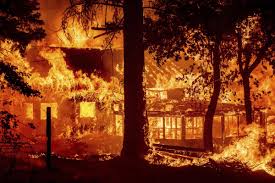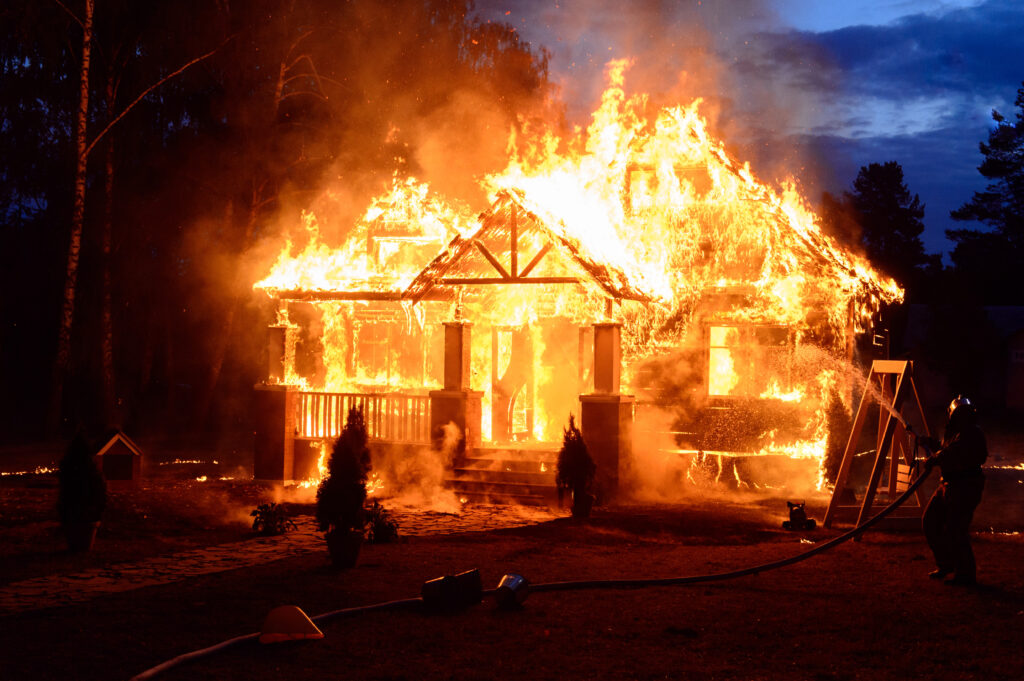Wildfires in California can burn homes, businesses, and entire neighborhoods. They can force people to flee, ruin precious belongings, and lead to costly repairs. Amid all this loss, many property owners turn to insurance for help. But what if your insurance company denies your claim? Does that mean you are stuck paying for everything yourself?
The answer is often “no.” You can take steps if you believe your insurer made a mistake or acted unfairly. In California, insurance companies must follow certain rules when selling policies and processing claims. If they fail to do so, you may have legal options.

Why an Insurance Company may Deny a Wildfire Claim?
Insurance companies deny claims for many reasons. Sometimes, they believe the policy does not cover the type of loss you suffered. Other times, they may say you did not file paperwork on time or failed to follow certain rules in your policy. They might argue that the damage was caused by something else (like normal wear and tear or a different cause), not wildfire.
In California, insurance companies must act in good faith when investigating and paying claims. That means they cannot ignore facts, delay for no reason, or rely on unfair excuses. They set rules about how soon they must pay once they settle a claim. For instance, Insurance Code § 2057 states that an insurer should pay your claim within 30 days after agreeing on the amount of the loss.
However, if the insurer decides they are not responsible, they might deny your claim entirely. Or they might offer you less money than you believe you deserve. Either way, it can feel like a big blow when you have already lost so much in a wildfire.
Is a Denial the End of the Road?
No, not necessarily. A denial may begin a process where you stand up for your rights. Sometimes, the insurer may have overlooked key facts or relied on incorrect information. You can gather more evidence, correct mistakes, or challenge their reasoning.
California courts have made it clear that insurers must do a thorough investigation. In Fadeeff v. State Farm, General Ins. Co., 50 Cal. App. 5th 94, the court said an insurance company should not deny a claim without a proper look at the facts. They must not jump to conclusions or ignore evidence that might support coverage.
Similarly, in Wilson v. 21st Century Ins. Co., 42 Cal. 4th 713, the California Supreme Court explained that an insurer cannot rely on reasons that lack support or contradict other findings. If the insurer denied your claim for a flimsy reason, you may have grounds to challenge it.
Did You Meet All Your Policy Requirements?
Before you contest a denial, you should check whether you followed your policy’s rules. Many insurance policies say you must report the loss quickly, protect your property from further damage, and submit a “proof of loss” form. If you fail to do these things, the insurer might argue you did not meet your obligations, giving them a reason to deny.
Make sure to:
- Let your insurer know about the damage as soon as possible.
- Keep receipts for any emergency repairs you made.
- Document everything with photos, videos, and notes.
If you forgot a step, the insurer might seize that to deny you. But sometimes, a court might still require them to pay if your mistake was minor or the insurer cannot show your delay harmed it. A California wildfire litigation lawyer can assess whether your mistake, if any, justifies a denial.
What if the Insurer Says Your Policy Doesn’t Cover Wildfire?

Some policies have exclusions that say they do not cover certain types of damage. However, many standard homeowners policies in California cover fire damage, including wildfire damage.
If your insurer says, “Sorry, your loss isn’t covered,” ask them to explain why. Check the exact wording in your policy. Does it truly exclude wildfires, or is there another type of exclusion the insurer is trying to apply?
In Fadeeff v. State Farm, the court warned against insurers denying claims without properly matching facts to policy language. If the insurer uses an exclusion that does not fit your situation, you may challenge that.
Did Insurer Deny It Because of “Insufficient Evidence”?
Insurance adjusters sometimes say there is not enough proof the wildfire caused your loss. They might claim the damage was from old age, pests, or a different event.
But if you have clear evidence—such as pictures of the fire’s path, records of smoke damage, or professional inspections—that the wildfire caused the harm, you can show the insurer they are wrong. Wilson v. 21st Century teaches that insurers must look at all the evidence fairly. They cannot just pick pieces that support their denial and ignore the rest.
Is There a Dispute Over the Amount of Damages?
Sometimes, the insurer agrees your policy covers fire damage but says the cost to fix or replace your property is much lower than you think. That is not a full denial of coverage but a denial of the higher amount you requested.
In such cases, your policy may have an appraisal or arbitration clause. You might use appraisal if you disagree about the amount of your loss. However, if the insurer completely denies coverage (saying the policy does not apply at all), an appraisal might not help.
Even so, if the only dispute is about the value of your home or belongings, you can consider using the policy’s process to resolve the difference. This might involve a panel of neutral professionals who decide the value.
Can This Be Bad Faith?
Insurance companies must act honestly and fairly, sometimes called the “implied covenant of good faith and fair dealing.” You might have a bad faith claim if they act unreasonably or without a valid basis.
For example, in Antonopoulos v. Mid-Century Ins. Co., 63 Cal. App. 5th 580, the insurer denied a claim after reinstating a policy without a lapse in coverage. The court said the insurer acted improperly.
Another example is State Farm Fire & Casualty Co. v. E. Bay Mun. Util. Dist., 53 Cal. App. 4th 769 underscores that insurers can be in trouble if they unreasonably delay or deny a payment. Talk to a lawyer if you suspect your insurer is stonewalling or making excuses. Bad faith claims can lead to extra damages beyond what your policy might pay.
Do You Have Any Rights Under California Insurance Code § 2057?
Yes, you do. Under California Insurance Code § 2057, insurers must pay claims within 30 days after settling on the amount of the loss. If the insurer “willfully fails” to pay, they can be responsible for interest and reasonable attorneys’ fees.
This rule means that once you and the insurer agree on how much your loss is worth, the insurer cannot delay cutting the check for weeks. If they do, you can point to § 2057 and argue they violated it.
However, note that you usually need a clear settlement in writing or a final agreement on the damages. If the insurer is still investigating or genuinely disputing the amount, the 30-day clock might not start.
Can You Sue the Insurance Company for Breach of Contract or Bad Faith?
If your policy covers your property against wildfire damage and the insurer denies or delays payment without a solid reason, you can sue for breach of contract. That says the insurer broke its promises in the insurance policy.
You can also sue for bad faith if you think the insurer acted unreasonably. In extreme cases, this can result in money to cover emotional distress, attorney’s fees, and even punitive damages. These lawsuits can be powerful, but they also take time and resources.
Are There Time Limits for Suing an Insurance Company?
Yes, there are. Insurance policies and California law often set deadlines for bringing a lawsuit. Some policies say you must sue within one year from the date of loss. Others might have different time limits.
In addition, certain rules may “toll” (pause) the time while the insurance company investigates or if there is a separate reason for delay. Because these timelines can be confusing, consulting a lawyer sooner rather than later makes sense. If you wait too long, you might lose your chance to pursue the claim in court.
How Can You Challenge a Denial Step by Step?
- Review Your Policy: Read the coverage, exclusions, and deadlines sections.
- Gather Documents: Collect photos, receipts, and any letters or emails between you and the insurer.
- Check the Denial Letter: Look for the reasons the insurer gave for denying your claim.
- Ask for an Explanation: If the denial is unclear, request a detailed explanation or a second review.
- Consult a Lawyer: A California wildfire litigation lawyer can see if the denial breaks the rules.
- File a Complaint or Lawsuit: Legal action might be your best option if the insurer does not budge.
- Consider Bad Faith: If the insurer’s actions seem unreasonable or dishonest, you might add a bad faith claim.
These steps let you track the process and stay on top of important details.
What If the Insurer Says Your Proof of Loss Is Incomplete?
Many policies require you to submit a “proof of loss” form. This document lists your damaged items, their value, and other details. If the insurer rejects your proof of loss, you might revise it or supply more information.
But if the insurer keeps demanding more documents or is never satisfied, ask yourself if they are stalling. Courts do not like it when insurers play games to avoid paying. If you sense that happening, a lawyer can gather strong evidence and show the insurer's actions lack fairness.
Can the Wildfire Be Someone Else’s Fault?

Yes, sometimes a wildfire is caused by a utility or another corporate entity’s negligence. For example, an electric company might fail to maintain power lines. If so, you can have a separate legal claim against that company for causing the fire in addition to your insurance claim.
What If the Insurer Blames You for the Fire?
Sometimes, an insurer tries to say the policyholder is responsible for the loss—like you did something that caused the fire or made it worse. If there is no evidence of that, you can challenge it.
But if you truly did something to cause or worsen the damage, your policy might not pay. For instance, the policy might not cover if you intentionally started the fire or ignored repeated fire warnings recklessly. However, those situations are rare, and the insurer must prove its claims.
Are You Required to Accept a Quick Settlement?
No. Sometimes, an insurer might offer a fast, small payment to settle. They hope you will grab it and move on. But if that amount does not cover your losses, you do not have to accept it.
You can negotiate or present more proof. You can also threaten legal action if you believe their offer is unfair. A California wildfire litigation lawyer can determine a fair amount and push the insurer to pay it.
If you settle, make sure you understand the full terms. You usually give up the right to sue later for any extra money. If you sign too quickly, you can lose out if you discover more damage later.
Talk to a California Wildfire Litigation Lawyer
Having your wildfire damage claim denied can feel like a second disaster. You are already struggling to rebuild your life after the fire, and now your insurance company says “no.” But do not give up. California law requires insurers to properly investigate claims and pay what they owe within a reasonable time. If they willfully fail to do so, they can owe you more than just the original claim amount.
Take action if you think your insurer is making excuses, ignoring evidence, or acting in bad faith. Gather all the information you can. Review your policy. Talk to a California wildfire litigation lawyer who knows how to handle insurance disputes and, if needed, lawsuits against parties that caused the wildfire in the first place. A lawyer can challenge a denial, negotiate a better payout, or file a case in court.
You do not have to face this alone. With the right help, you can stand up for your rights and seek the coverage you deserve. Call 1-800-WILDFIRE and contact a California wildfire litigation lawyer today to explore your options, protect your interests, and move one step closer to rebuilding your life.